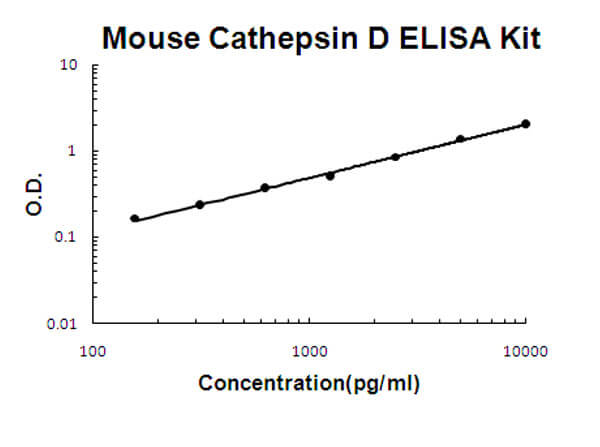Mouse Cathepsin D ELISA Kit
KOA0388
1 Kit
ELISA
Mouse
156 pg/ml - 10000 pg/ml
Shipping info:
$50.00 to US & $70.00 to Canada for most products. Final costs are calculated at checkout.
Product Details
Mouse Cathepsin D AccuSignal ELISA Kit - KOA0388
CATD_HUMAN, Cathepsin D heavy chain, Ceroid lipofuscinosis neuronal 10, CLN10, CPSD, ctsd, Lysosomal aspartyl protease
ELISA Kit
156 pg/ml - 10000 pg/ml
Target Details
CTSD - View All CTSD Products
Mouse
Expression system for standard: NSO; Immunogen sequence: I21-L410
Natural and recombinant mouse Cathepsin D. There is no detectable cross-reactivity with other relevant proteins.
P18242 - UniProtKB
NP_034113.1 - NCBI Protein
Application Details
ELISA
Useful in Sandwich ELISA for Quantitative Detection of Antigen. Aliquot 0.1ml per well of the 10000pg/ml, 5000pg/ml, 2500pg/ml, 1250pg/ml, 625pg/ml, 312pg/ml, 156pg/ml mouse Cathepsin D standard solutions into the precoated 96-well plate. Add 0.1ml of the sample diluent buffer into the control well (Zero well). Add 0.1ml of each properly diluted sample of mouse cell culture supernates, serum or plasma(heparin, EDTA) to each empty well. It is recommended that each mouse Cathepsin D standard solution and each sample be measured in duplicate.
Formulation
Heparin Sodium
1 Kit
Shipping & Handling
Wet Ice
Store vials at 4°C prior to opening. Centrifuge product if not completely clear after standing at room temperature. This product is stable for 6 months at 4°C as an undiluted liquid. Dilute only prior to immediate use. For extended storage freeze at -20°C or below for 12 months. Avoid cycles of freezing and thawing.
See kit insert for complete instructions.
Cathepsin D is a protein that in humans is encoded by the CTSD gene. This proteinase is a member of the peptidase C1 family, having a specificity similar to but narrower than that of pepsin A. It is mapped to 11p15.5. The cDNA encodes a 412-amino acid protein with 20 and 44 amino acids in a pre- and prosegment, respectively. Cathepsin D is one of the lysosomal proteinases. It is ubiquitously expressed and is involved in proteolytic degradation, cell invasion, and apoptosis. Mutations in this gene are involved in the pathogenesis of several diseases, including breast cancer and possibly Alzheimer disease and it has been considered as a breast cancer tumor marker.
This product is for research use only and is not intended for therapeutic or diagnostic applications. Please contact a technical service representative for more information. All products of animal origin manufactured by Rockland Immunochemicals are derived from starting materials of North American origin. Collection was performed in United States Department of Agriculture (USDA) inspected facilities and all materials have been inspected and certified to be free of disease and suitable for exportation. All properties listed are typical characteristics and are not specifications. All suggestions and data are offered in good faith but without guarantee as conditions and methods of use of our products are beyond our control. All claims must be made within 30 days following the date of delivery. The prospective user must determine the suitability of our materials before adopting them on a commercial scale. Suggested uses of our products are not recommendations to use our products in violation of any patent or as a license under any patent of Rockland Immunochemicals, Inc. If you require a commercial license to use this material and do not have one, then return this material, unopened to: Rockland Inc., P.O. BOX 5199, Limerick, Pennsylvania, USA.

